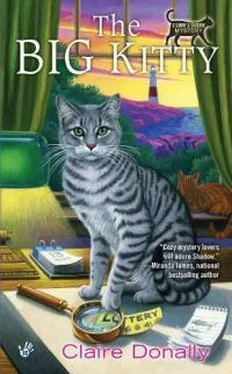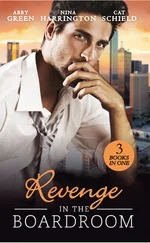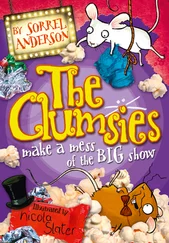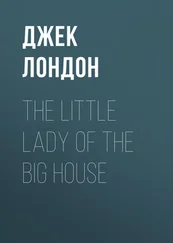“I can talk to the other guys,” Semple said. “Explain the situation to them. Make sure we manage to swing by here and keep an eye on things.” His lips curved in a faint smile. “We can always write more tickets next month.”
“And to think, it was the cat that saved us.” Mike shook his head, still not quite able to believe it.
“That cat you’ve got here saved you?” Will shot a sharp look at Sunny, who just shrugged. This was her father’s story. She’d let him handle it.
Mike ushered Will out to check the evidence, determined to prove his theory. Sunny and Ben trailed behind.
When Will straightened up from looking at the teeth marks on the hose, he was trying hard not to laugh.
“What’s so funny?” Sunny demanded.
“Of course, you don’t know the reason why this thing was at Sal’s in the first place.” Will tried to keep a straight face. “The fuel gauge is screwed up. It reads full when the tank is almost empty. No matter what the cat did, the Jeep’s engine would have conked out in minutes.”
“So there wouldn’t have been enough carbon monoxide to kill us?” Sunny said.
“Not based on what Sal told me,” Will replied. “Of course, if the thief was a tweaker, he might not even have checked the gas gauge anyway.”
“So maybe the cat saved us, maybe not.” Mike stood over his winterized plants. “One thing I know for sure. That fur-coated little s.o.b. peed all over my roses!”
*
Sunny decided thatcarbon monoxide poisoning—even attempted carbon monoxide poisoning—offered a reasonable excuse for a mental health day. While the police prepared to tow off the maroon Wrangler (Will had successfully prodded the sheriff’s department into action by suggesting that possible grand theft auto should justify dusting the SUV for fingerprints), she phoned Ollie and told him he’d have to arrange some coverage for the office. He growled and grumbled, but Sunny stood her ground until he gave in.
Then, as she was making breakfast for her dad and herself, Sunny got a call from Ken Howell at the Crier . “Heard there was some excitement up by your way this morning,” he said.
“I’d like to say I’m getting used to it, but that wouldn’t strictly be the truth,” she told him.
“Not sure I like it when reporters end up in the middle of the news instead of just writing about it,” the editor told her. “On the other hand, I’m thinking about running a sidebar—”
“That’s the last thing I want,” Sunny interrupted.
“I hope you’re not having second thoughts about the story.” His voice rose in an anxious tone. “We’re supposed to be going to print tonight.”
“I was going to do a quick phone interview with the Ellsworths,” Sunny said. “But since I’m not going in to MAX today, I’ll do it in person and work it into what I’ve already got. Don’t worry, you’ll have your story.”
“Yeah, everybody’s looking forward to it,” Ken informed her dryly. “Veronica Yarborough was on the phone to me just yesterday, reminding me that the homeowners’ association keeps lawyers on retainer.”
“Lots of fun.” Sunny sighed and shook her head as she and Ken ended the call. It would probably ruin his breakfast, but it looked as if she’d have to tell Mike more about the unwelcome present in her car.
“Dad,” she began. “About the Mustang …”
“Useless when winter really sets in around here,” Mike said. “Just as well that jackass fooled around with it and killed the steering.”
Sunny stared at him for a second, openmouthed. “You knew about that?”
“I suspected something was fishy when you first told me, and Helena Martinson filled me in on the rest. We figured you didn’t want to talk about it to keep me from getting upset.”
They both involuntarily glanced toward the front of the house where the Wrangler had been left to kill them. “Looks like that worked out just fine,” Sunny said wryly.
“Speaking of Helena, you may want to ask if you can borrow her car. It’s a haul to get out to the Ellsworth place, especially if all you’ve got is a bicycle.”
Sunny phoned their neighbor and barely got out her request before Mrs. Martinson said she’d bring the car right over. The woman was as good as her word, delivering the car and then quickly walking out with a minimum of conversation.
That’s not like the Helena Martinson I know, Sunny thought. But then she remembered the last time they’d seen each other, and what Mrs. Martinson and her dad were probably doing. Maybe she’s a little too embarrassed to chat easily, Sunny decided. Which is fine by me, too.
She settled herself behind the wheel of the car, a good, dependable Buick, for the trip to the Ellsworth farm. It was another clear morning, a nice day to enjoy a drive out to the country. On the other hand, there wasn’t much country left nearby to enjoy anymore. The rising tide of development kept turning old family farms into spreads of half-acre homes.
Years ago, when Sunny was a kid, her parents would choose a good, crisp autumn Saturday and head off to Old Man Ellsworth’s for an afternoon of apple picking. She could remember sitting in the backseat, watching miles of fields pass by. Now it was a lot of would-be stately homes until at last she saw the big white barn she remembered, with the familiar sign, WELCOME TO ELLSWORTH’S PICK ’EM YOURSELF. Back in second grade, they used to joke that the sign referred to noses.
Sunny pulled up in a gravel parking lot, empty today, and headed for the farmyard where she’d spotted a man—at least the bottom end of him. His head and arms were hidden by the innards of his tractor.
“Hello?” Sunny called.
The man uncoiled from the tractor to reveal himself as a tall, lanky guy in overalls and a flannel shirt, with a surprisingly boyish face.
Sunny suddenly recognized him as the tall, gangly boy who’d been a couple of grades ahead of her—the one with a perpetual cowlick. He never could hope to be one of the cool kids. In fact, he had been the butt of that nose-picking joke.
Well, he’d filled out a bit since grade school. Sunny couldn’t tell about the cowlick. He was wearing a John Deere cap.
“Hope you weren’t all fired up to go apple picking,” the man said with a cheerful smile. “I’m afraid we’re closed today. Open Tuesdays, Thursdays, Saturdays, and Sundays,” he recited. “The rest of the week we spend keeping the place going.”
When Sunny introduced herself and explained why she was there, the man wiped away some oil on an old rag and presented a hard, callused hand to shake. “Nate Ellsworth. So you want to talk about our trouble with Mrs. Spruance.” He sighed. “I hoped it’d be over when that poor woman died. Hear the animal control people collected all her cats.”
“It’s pretty amazing that they would come all this way,” Sunny said.
“To tell the truth, we thought so, too,” Nate replied. “I guess we’re the nearest working farm to town.” He grimaced. “Town keeps coming closer and closer, these days.” Gesturing to the fields around him, he said, “We’ve had four generations of Ellsworths farming this land. Thirty acres.”
The orchard was pretty much as Sunny remembered it, neat rows of trees stretching off into the distance. A rounded hill rose in the middle of the land. To Sunny’s younger self, it had looked as if a giant had been buried up to his eyebrows, the foliage on the rounded knoll being his hair.
“My granddad went over to the pick-it-yourself business,” Nate went on. “Dad put in the cider press. We introduced lower trees—easier for the kids to get at the apples—and put in about fifteen acres of blueberry bushes. That way, people can come and pick something anywhere between July and November, if we’re lucky. Got a few pumpkin vines, too, for jack-o’-lanterns and Thanksgiving.”
Читать дальше











